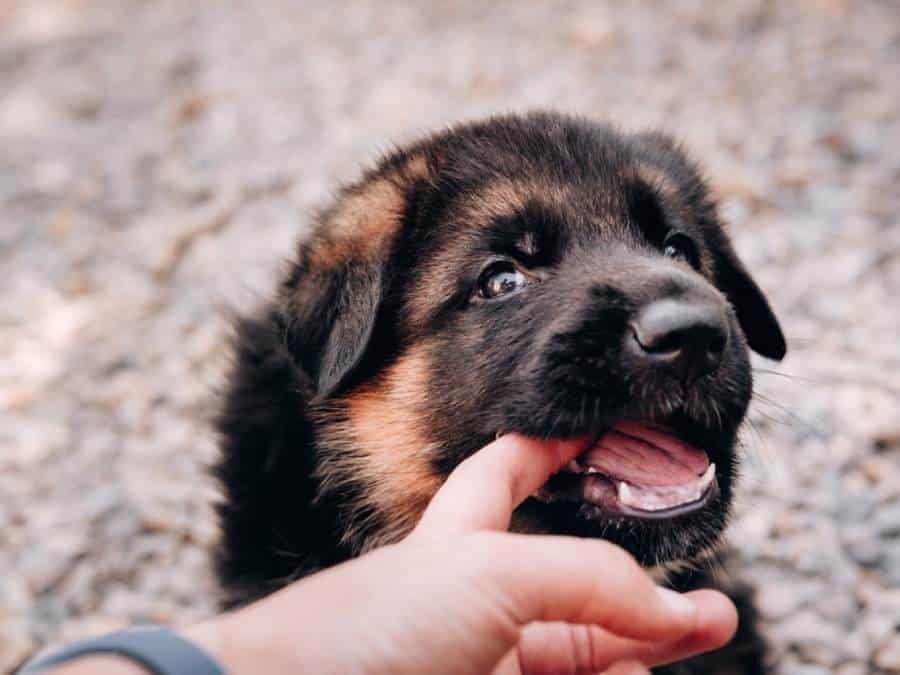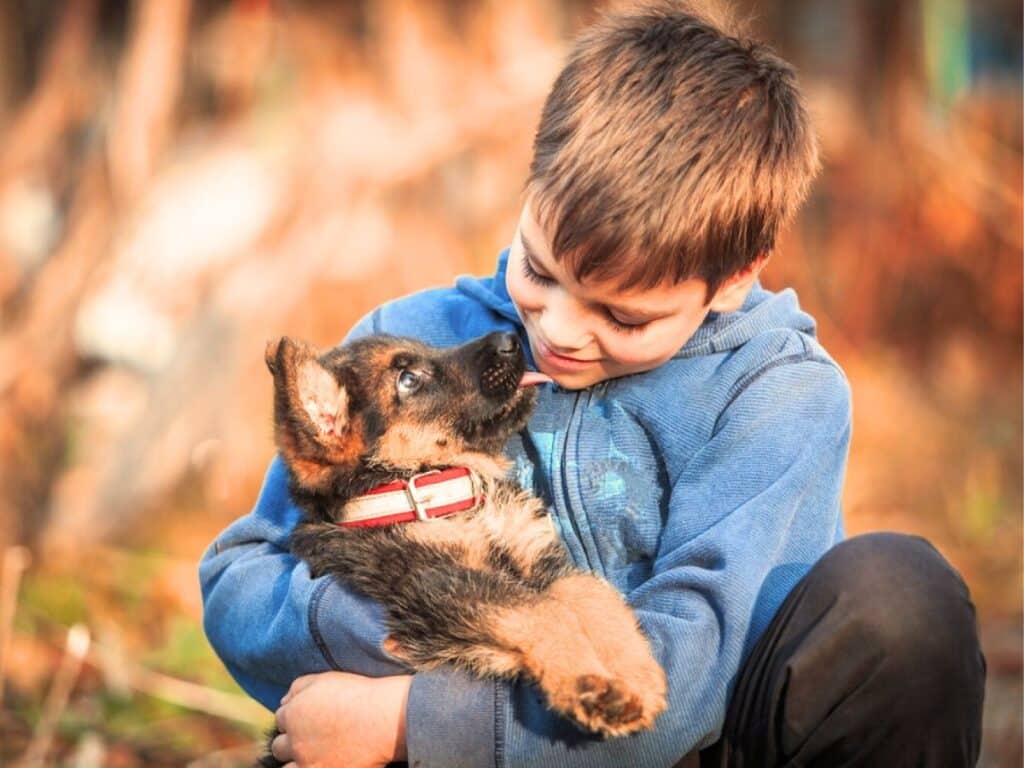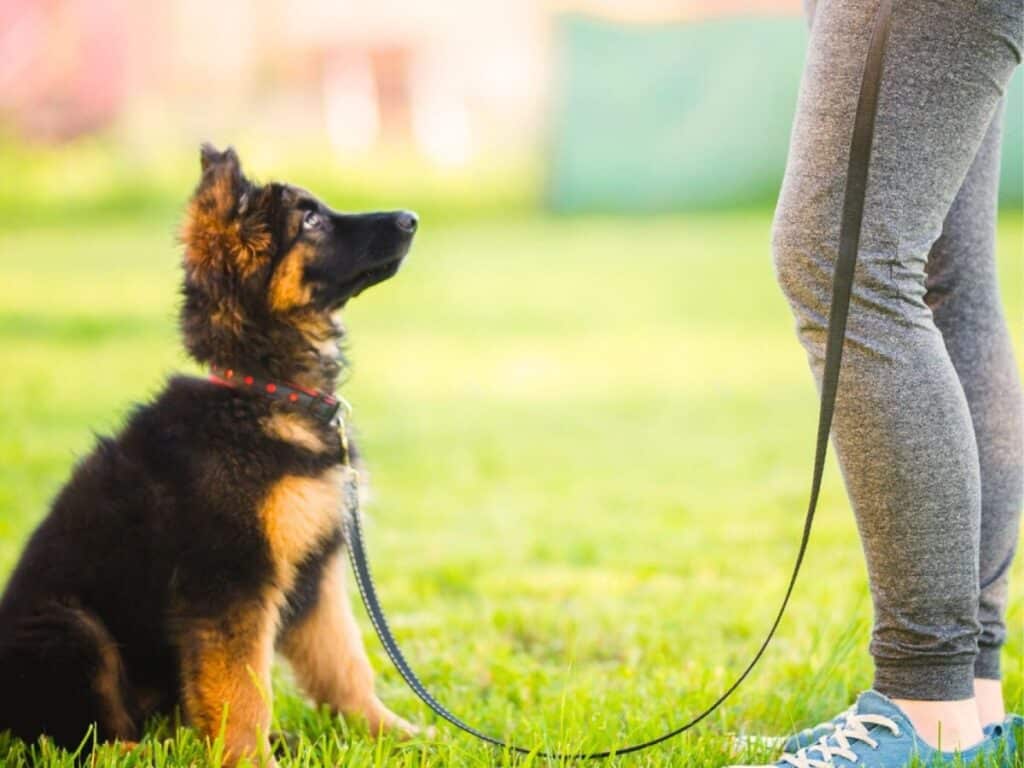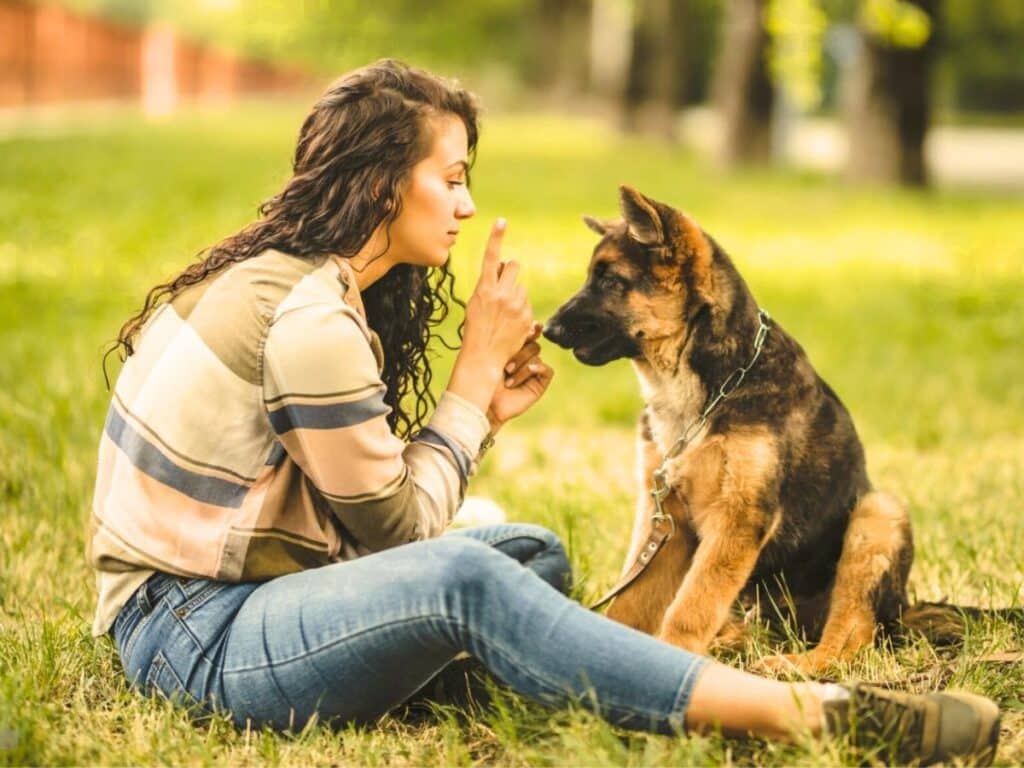Are you tired of your adorable German Shepherd puppy sinking their sharp little teeth into everything they come across?
Well, while completely eradicating biting might be unrealistic, we can certainly teach our German Shepherd puppies how to control their bite force and redirect their chewing instincts towards appropriate toys.
So, throughout this blog post, we’ll provide you with expert advice on how to stop your German Shepherd puppy from biting excessively. From understanding the importance of addressing this behavior to exploring the benefits of early intervention – we’ve got you covered.
How to Stop German Shepherd Puppy From Biting
To stop your German Shepherd puppy from biting, offer appropriate chew toys, use positive reinforcement for gentle behavior, redirect their attention to toys, and teach bite inhibition through yelps or time-outs. Consistent training, socialization, and exercise are key, and if issues persist, consult a professional trainer or behaviorist.
Addressing puppy biting behavior is an important step in their training process. Here are some steps you can take to help stop your German Shepherd puppy from biting:

1. Teach your pup bite inhibition
Puppies learn a lot about bite inhibition from their littermates. During play, you’ll notice that if one puppy bites too hard, the other puppy will yelp and stop playing.
This teaches the biting puppy that their playmate was hurt, and they learn to adjust their bite force to prevent causing harm.
During play sessions with your puppy, use gentle interactions that mimic the behavior of their littermates.
Gently allow your puppy to mouth your hand or fingers, and when they bite down too hard, let out a high-pitched “ouch” sound to imitate a puppy’s yelp.
When your puppy responds to your “ouch” by releasing their bite or lessening the pressure, praise and reward them with treats, pets, or play. This reinforces the idea that gentle behavior leads to positive outcomes.
Make sure that you don’t laugh or smile during this process, however cute your puppy looks while nipping.
RELATED: German Shepherd Behavior Stages By Age
2. Use time-outs effectively when needed
If your puppy doesn’t respond to yelps or redirection and continues to bite, it may be necessary to give them a time-out. Gently remove yourself from their presence without scolding or punishing them.
This teaches them that biting leads to the end of playtime and attention. Give them a few minutes alone in a safe space, such as a crate or designated area, before allowing them back into the play area.
Consistency is crucial here – make sure everyone in the household follows this approach.
RELATED: How to Crate Train a German Shepherd Puppy?
3. Provide proper chew toys
Puppies have a natural urge to chew, and it’s important to provide them with appropriate chew toys. Having a variety of chew toys available can help redirect their biting behavior towards acceptable items.
Look for toys specifically designed for teething puppies, such as rubber or nylon toys that are durable and safe for chewing.
Avoid giving your puppy old shoes or household items as chew toys, as this can confuse them and encourage inappropriate chewing behavior.
4. Use positive reinforcement
When your puppy displays gentle behavior, such as licking or nuzzling instead of biting, make sure to praise and reward them with treats or affection.
This reinforces the idea that gentle behavior is preferred and encourages them to continue behaving in this manner. Consistency is key here – be sure to reward your puppy every time they exhibit non-biting behavior.
You can also check out this online training program called Brain Training for Dogs! This innovative program not only enhances your pup’s intelligence but also tackles pesky puppy-biting behavior.
5. Redirect your puppy’s biting behavior
When your German Shepherd puppy starts to bite, it’s important to immediately redirect their attention to a more appropriate object, such as a chew toy or puzzle feeder.
This teaches them that biting humans isn’t an acceptable way to play. You can also engage them in interactive play sessions using tug ropes or balls, which not only redirects their biting tendencies but also provides mental stimulation and exercise.
RELATED: How To Discipline A German Shepherd Puppy
6. Use training commands
Basic training commands like “sit,” “stay,” and “leave it” are essential for teaching your German Shepherd puppy self-control and redirecting their biting behavior.

By practicing these commands regularly, you can help your puppy learn to focus on you rather than resorting to biting. Start with short training sessions and gradually increase the duration as your puppy becomes more comfortable and responsive.
RELATED: 30 German Shepherd Basic & Advanced Training Commands
7. Socialization
Socializing your German Shepherd puppy is crucial for their overall development and can help reduce their tendency to bite out of fear or uncertainty. Expose them to various people, dogs, and environments from an early age so they become familiar with different stimuli.
Arrange supervised playdates with other friendly dogs, take them for walks in different neighborhoods, and introduce them to new experiences such as car rides or visits to pet-friendly establishments.
The more positive interactions they have, the more confident they will become.
8. Provide enough exercise and mental stimulation
Biting can often be a result of excess energy, boredom, frustration, or the lack of appropriate outlets for their natural instincts.
Regular physical exercise helps burn off excess energy that can contribute to restlessness and unwanted behaviors, including biting. When a dog has an appropriate outlet for their energy, they are less likely to engage in biting out of pent-up frustration.
Mental stimulation, such as training sessions, puzzle toys, and problem-solving games, can tire out a dog just as much as physical exercise. When a dog’s mind is exhausted from working on puzzles or learning new commands, they’re more likely to relax and refrain from engaging in excessive biting.
9. If all else fails, consult a professional dog trainer
If the biting behavior is persistent or aggressive, consider seeking guidance from a professional dog trainer or behaviorist. They can provide personalized advice based on your specific situation.
Remember, training takes time and patience. Be consistent, positive, and reward good behavior. Over time, with proper training and positive reinforcement, your German Shepherd puppy should learn to control their biting impulses and develop into a well-behaved adult dog.
RELATED: Are German Shepherds Easy To Train?
Mistakes to Avoid when Teaching Bite Inhibition
Let’s go through some key mistakes to steer clear of when working on bite inhibition with your pup:
1. Punishing or scolding a puppy for natural mouthing behaviors
Let’s face it, puppies love to explore the world with their mouths. It’s completely natural for them to engage in mouthing behaviors, including gentle nipping and biting.

However, when you punish your puppy for mouthing, they may become confused and fearful. This could lead to an increase in anxiety and potentially aggressive behavior down the line.
Instead of punishment, it’s important to redirect your puppy’s attention to appropriate chew toys or bones whenever they start nipping at your hands or clothing.
2. Allowing rough play that encourages excessive biting
While it’s crucial for puppies to engage in playtime, allowing rough play without setting boundaries can inadvertently encourage excessive biting.
To avoid this mistake, it’s essential to establish clear boundaries during playtime. Teach your puppy that gentle nibbling is acceptable but discourage any behavior that crosses the line into aggressive biting by ending the play session immediately.
3. Not being consistent in bite inhibition training
Teaching bite inhibition requires consistency from everyone around your pup. If one family member allows rough play or biting, while others discourage it, your pup will get mixed signals. Make sure everyone’s on the same page.
4. Failing to socialize your puppy
If your pup doesn’t interact with other dogs or people, they might not learn appropriate bite pressure. Socialization is crucial for learning how to play gently. Isolating them might lead to them being unsure of how to interact properly.
5. Not providing alternatives for biting behavior
If you don’t offer appropriate toys or objects for your pup to chew on, they might naturally turn to your hands, feet, or furniture. Provide plenty of chew toys to give them something acceptable to gnaw on.
6. Not rewarding soft bites
When your pup does use a softer bite or stops biting when you say “ouch,” make sure to give them positive reinforcement. Praise them, pet them, or offer a treat to let them know they’re on the right track.
7. Neglecting proper training
Focusing solely on bite inhibition might mean you’re neglecting other training areas. Basic obedience commands like “sit,” “stay,” and “leave it” can help you manage and redirect biting behavior effectively.
8. Giving up too soon
Teaching bite inhibition takes time. If you give up because you’re not seeing instant results, your pup won’t have the chance to learn this crucial skill. Patience and consistency are key.
Why Do German Shepherd Puppies Bite So Much?
German Shepherd puppies bite frequently due to teething discomfort, exploration, play, and socialization. They’re curious and learn about their environment through biting. Proper training, redirecting to toys, and consistent socialization help them learn bite inhibition and appropriate behavior over time.

This behavior is a normal and natural part of their growth and exploration process. There are several reasons why German Shepherd puppies tend to bite so much:
1. Teething
Just like human babies, puppies go through a teething phase where their gums can be uncomfortable or itchy. Chewing and biting help soothe their sore gums as new teeth come in.
2. Exploration
Puppies experience the world primarily through their mouths. They use their sense of taste and touch to learn about objects, surfaces, and textures around them. Biting is a way for them to gather information about their environment.
3. Play and Socialization
Play is a crucial aspect of a puppy’s development. Biting is a form of play for them, especially during interactions with littermates. They learn about bite inhibition and appropriate play behavior by interacting with their siblings.
4. Curiosity
Puppies are naturally curious beings. Biting allows them to explore their surroundings and understand cause-and-effect relationships. They’re learning what happens when they bite something, and this curiosity drives their behavior.
5. Interaction with people
Puppies learn a lot about their environment and social interactions by interacting with people. Biting may occur during play with humans, and they might not yet understand that humans have more delicate skin compared to their littermates.
6. Lack of impulse control

Puppies are still developing self-control and impulse management. It takes time for them to learn how to control their biting pressure and understand when it’s appropriate to do so.
7. Attention seeking
Puppies crave attention and interaction. Biting can get a reaction from their human companions, whether it’s positive attention or negative scolding. They might not yet know the difference.
8. Energy release
Puppies have a lot of energy to burn. Biting and playing are outlets for their excess energy. If they’re not provided with enough physical and mental stimulation, they might resort to biting as a way to release that energy.
It’s important to note that while biting is a normal behavior for puppies, it’s crucial to teach them appropriate bite inhibition and redirect their biting onto appropriate toys and objects.
Consistent training, socialization, positive reinforcement, and providing plenty of chew toys can help address this behavior over time.
Choosing the Right Toys and Redirecting Biting Behavior
If you’re wondering how to stop your German Shepherd puppy from biting, one effective approach is to focus on choosing the right toys and redirecting their biting behavior.
By providing them with appropriate outlets for their natural chewing instincts, you can help steer them away from nipping at you or other household items.

Let’s explore some key strategies to achieve this.
1. Identifying safe chew toys
Look for sturdy chew toys made of durable materials such as rubber or nylon. These options are designed to withstand the strong jaws of a growing German Shepherd puppy.
Consider textured chew toys that massage their gums during the teething phase. These types of toys can provide relief from discomfort and discourage them from seeking alternative objects like furniture or shoes.
Some chew toys come with hidden compartments where treats can be inserted, offering mental stimulation while satisfying their chewing instinct.
Take a look at this fantastic set of 9 chew toys on Amazon, designed specifically for German Shepherds. With this set, you might not even have to consider getting additional chew toys – it’s a complete package tailored to your GSD’s needs.
2. Using interactive toys that engage both mind and body
Interactive toys stimulate GSDs mentally while burning off excess energy. Puzzle feeders, treat-dispensing balls, and interactive tug ropes are great options.
Puzzle feeders require puppies to work out how to access hidden treats by manipulating different parts of the toy. This not only keeps them entertained but also encourages problem-solving skills and improves impulse control over time.
Check out this stimulating puzzle feeder (Amazon) crafted to enhance your pet’s IQ. Unlike traditional toys, this one offers food rewards and promotes intelligence as your dog engages with it.
Treat-dispensing balls allow your puppy to roll the toy around in order to release tasty rewards. Here’s a treat dispensing ball (Amazon) that provides mental stimulation while redirecting their focus away from nipping and towards the toy itself.
At What Age Do German Shepherd Puppies Stop Biting?
German Shepherd puppies typically start to show significant improvements in their biting behavior between 4 to 6 months of age. As they continue to mature and receive consistent training, their bite inhibition skills develop further. By around 8 to 10 months of age, most German Shepherd puppies have substantially reduced their biting tendencies.

German Shepherd puppies, like all puppies, go through various developmental stages that can influence their biting behavior. During their early weeks, puppies explore the world around them with their mouths.
They use biting as a way to interact and learn about their environment. This behavior is especially prominent during the teething stage when they experience discomfort and chew on objects to alleviate it.
As German Shepherd puppies mature and continue socializing with other dogs and humans, their biting tendencies gradually decline.
Typically, by around four months of age, most German Shepherd puppies begin showing significant improvement in controlling their bites. However, individual variations mean that some may take up to six months or more before fully curbing their biting habits.
Conclusion
In conclusion, stopping a German Shepherd puppy from biting requires effective techniques and an understanding of their behavior. Use positive reinforcement techniques to teach bite inhibition, avoid common mistakes, redirect their biting towards appropriate toys, and be patient as your puppy grows out of this phase. By following these steps, you’ll be well on your way to having a well-behaved German Shepherd companion.
Frequently Asked Questions (FAQs)
1. How long does it take for a German Shepherd puppy to stop biting?
There is no specific timeframe as every puppy is different. However, with consistent training and reinforcement techniques, most German Shepherd puppies start showing improved behavior within a few weeks or months.
1. Why do German Shepherd puppies bite so much?
Biting is a natural behavior for puppies to explore their environment, teethe, and play. It’s essential to teach them proper bite inhibition and redirect their biting onto appropriate items.
2. How can I teach my German Shepherd puppy not to bite hard?
Use a combination of techniques like yelping when bitten too hard, providing appropriate chew toys, and positive reinforcement for gentle behavior to teach bite inhibition.
3. Can I use punishment to stop my puppy from biting?
Avoid punishment as it can lead to fear and worsen behavior. Focus on positive reinforcement, redirection, and consistent training methods.
4. What toys are best to redirect biting behavior?
Choose sturdy chew toys made for teething and biting, like rubber or nylon toys. Puzzle toys that dispense treats can also keep your puppy engaged and redirect their biting.
5. Should I let my puppy mouth my hands during playtime?
While gentle mouthing is a part of play, it’s best to redirect their attention to toys. Consistently allow only soft bites or avoid allowing them to mouth your hands to prevent confusion.




